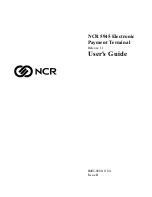
NOTES:
1. Industry Standards: ATEX Directive 94/9/ECATEX
Sira 09ATEX3224U
Ex e IIC Gb
Ex tb IIIC Db IP 66
EN 60079-0:2009
EN 60079-7:2007
EN 61241-0:2006
EN 61241-1:2004
IECEx
IECEx SIR 09.0099U
Ex e IIC Gb
Ex tb IIIC Db IP 66
IEC 60079-0:2007-2010
IEC 60079-7:2006-2007
IEC 61241-0:2004IEC 61241-1:2004
TestSafe ANZEx 12.3011U
UL 508A Listed; Type 4, 4X, 12; File No. E61997
cUL C22.2 No. 94 Listed; Type 4, 4X, 12; File No. E61997
NEMA/EEMAC Type 4, 4X, 12
IEC 60529, IP66
Visually inspect gaskets, locks and screws after each opening of covers or removing of gland plates.
2.
Internal body grounding terminal shall be used for the equipment grounding connection and the external is for
3.
supplementary bonding connection where local codes or authorities permit or require such connection.
Earth grounding must be connected by lug on end of the cable. (A UL listed ring connector is required for Class I,
4.
Zone 1 applications).
The number and arrangement of terminal blocks or other wiring terminals is to be determned in the end-use
5.
investigation.
Enclosure openings must be filled by equipment marked with the same certification as the enclosure.
6.
General Guide to Cable Entry Positions into Cable Gland or Enclosure Side:
a.Maximum hole diameter is major thread diameter of cable gland plus 0.7mm (.03”)
b. Minimum material to be maintained between holes:
Glands M16 through M32: 15mm (0.59”)
Glands M35 through M75: 20mm (0.79”)
Glands M75 through M100: 35mm (1.38”)
Prior to making holes in the enclosure wall or gland plate, verify that the selected gland will not have
interference with the sealing washer and lock nut.
c. Hole location must be located so sealing washer and locknut do not interfere with gasket.
d. Select a gland for the correct application with the proper certifications. Make certain all cable gland
accessories are included for through hole installation. Additional accessories may include locknut and sealing
washers.
e. Install the gland in accordance to the manufacturers instructions.
Painted Enclosures require these additional instructions:
7.
For fixed installations minimize the risk of electrostatic discharge of painted enclosures
a. Remove the explosive atmosphere prior to contact or cleaning
b. Make certain enclosure is grounded and external enclosure ground connection is made; all conducting parts
should be properly bonded.
c. For painted surfaces, avoid friction with surface, only clean with wet cloth moistened with de-ionized water.
d. Avoid contact in low relative humidity environments. Increase environment humidity where possible.
2/4






















